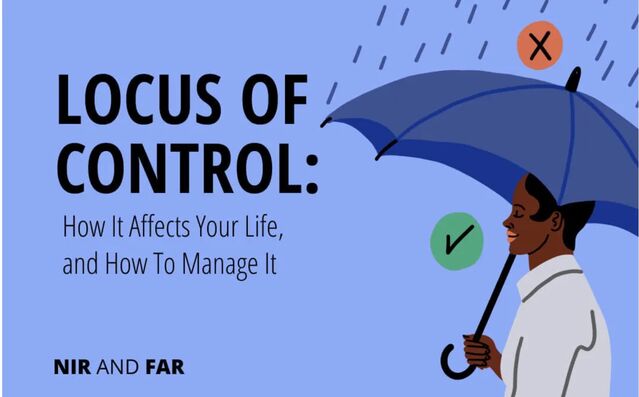Locus of Control
How Your "Locus of Control" Affects Your Life
Learn how to manage your locus of control to your benefit.
Posted November 4, 2022 Reviewed by Tyler Woods
Key points
- People with an external locus of control believe that forces outside them are responsible for the events in their life.
- Those with an internal locus of control believe that their personal decisions and efforts guide much of their lives.
- Wherever you fall on the spectrum, you may benefit from understanding your own orientation and how it may shape your behavior.
My daughter had just pulled the caramel corn out of the oven, and the sticky-sweet smell was almost irresistible. Despite knowing it wasn’t going to help my diet, I was gnawing for a taste. But instead of kindly asking for a small bite, as I should have, I barked, “Damn this caramel corn!”

Cursing my daughter’s hard work earned me a scowl, and, if I’m honest with myself, didn’t set a good example for how a grown-up should handle himself. It wasn’t my daughter’s responsibility to manage what I put in my mouth, and it certainly wasn’t the caramel corn’s. Still, I blamed the caramel corn for tempting me, instead of taking responsibility for my urges.
Your reaction to life events—specifically how you explain them—significantly affects your life outcomes.
Of course, there’s a continuum—nobody thinks their life is 100 percent under their control. But our orientation toward what we believe influences our life has a profound impact on us.
Psychologists refer to this concept as a “locus of control,” a term psychologist Julian Rotter coined in the 1960s.
People with an external locus of control believe that forces outside them—fate, luck, circumstances, caramel corn—are responsible for the events of their lives.
In contrast, those who perceive an internal locus of control believe that their personal decisions and efforts guide much of their lives.
Interestingly, you could have an external locus of control about one area of your life but an internal locus of control about another: You may believe your health is completely genetic, uninfluenced by your choices, but think the success of your career is a direct result of your hard work.
How does your locus of control affect your behavior?
If you think finding a partner is up to fate, you may not feel the need to actively seek, meet, and get to know new people. But if you think you have control over it, you may try harder to put yourself out there. In professional contexts, if you think a promotion is largely outside of your control, you won’t be driven to pursue it. If you see it as a result of your efforts, you’re more likely to endeavor to deliver good work.
Countless studies have demonstrated the importance of locus of control in determining numerous life outcomes.
For example, the perception that 10-year-olds have of their own agency has been shown to significantly predict their health outcomes in their thirties, including obesity, overall health, and psychological distress; those with a more internal locus of control in childhood have a reduced risk of poor health later on. Internal locus of control is also associated with psychological well-being, academic, and professional success.
However, there is no “correct” locus of control, even though studies generally suggest that having an internal locus of control is advantageous. Both extremes can present disadvantages.
Wherever you fall on the spectrum, you may benefit from understanding your own orientation and how it may shape your behavior.
Discover your locus of control
Rotter’s full Locus of Control Scale is a 29-item questionnaire (PDF). But to get a quick sense of where you fall on the spectrum, consider which group of statements below resonates more with you.
Internal locus of control:
- In my case, getting what I want has little or nothing to do with luck.
- It is impossible for me to believe that chance or luck plays an important role in my life.
- People are lonely because they don’t try to be friendly.
- In the long run, people get the respect they deserve in this world.
- There is a direct connection between how hard I study and the grades I get.
External locus of control:
- Many times we might just as well decide what to do by flipping a coin.
- Many times I feel that I have little influence over the things that happen to me.
- There’s not much use in trying too hard to please people; if they like you, they like you.
- Unfortunately, an individual’s worth often passes unrecognized, no matter how hard they try.
- Sometimes I can’t understand how teachers arrive at the grades they give.
Understanding the strengths and weaknesses of your locus of control
Psychologists generally agree that, although our locus of control is largely established through experiences of reward and punishment when we are children, it is a flexible construct that can change throughout our life. However, not much research has been done on targeted interventions to change one's locus of control. Even so, we can notice how our locus of control may affect our life, and we can strive to reduce any negative effects it may have.
If you have an external locus of control…
Good news: If you have a more external orientation, you may be both more willing to let things go and better at sharing work with others. On the other hand, you may feel less motivated to put time and effort into tasks since they feel beyond your control.
Here are a few strategies to make sure your locus of control doesn’t get in your way:
- Practice accountability. When something happens—good or bad—step back and think through what part you played in it. Identify both the contributing external and internal forces.
- Catch external-oriented thoughts and challenge them. When you find yourself blaming something bad on external forces or crediting luck for your success, be mindful of the stories you’re telling yourself and reassess your own role in these outcomes.
- Avoid black-and-white thinking. You hardly ever have zero control over what happens. Open your mind to the gray areas in every situation.
- Write it out. Writing can be a great way to see your thoughts a little more objectively. If you can do a brain dump on paper, you can get a clearer picture of how you think about a situation, which can help in practicing all of the above strategies.
- Change your mindset. While locus of control interventions haven’t been well studied, mindset interventions have, and there is a lot of overlap between the two. Learn about and cultivate a growth mindset to improve self-agency, motivation, and resilience.
If you have an internal locus of control
Although an internal locus of control has many benefits—motivation, health, success—there are still some pitfalls to watch out for.
Here’s how to avoid them:
Delegate. Those who lean more internal on the locus of control spectrum may find it difficult to delegate since they are accustomed to feeling in control. Stretch yourself to share tasks with others rather than do every little thing yourself.
Let it go. When you perceive life to be largely in your control, you may routinely find yourself stuck in self-blame. Take the time to reflect on the internal and external contributors to situations, and then move on. Ruminating about your role in something can be unproductive and discouraging.
“Control the controllables.” A mantra of many professional athletes, this phrase reminds us that we can control certain variables but not others. Strive to control what you can, but make peace with the uncontrollables and their inevitable impact.
Regardless of where you lie on the locus of control spectrum, you’ll likely appreciate knowing how your orientation affects your life and how you can avoid the pitfalls it may lead you to.




